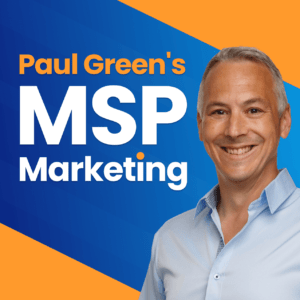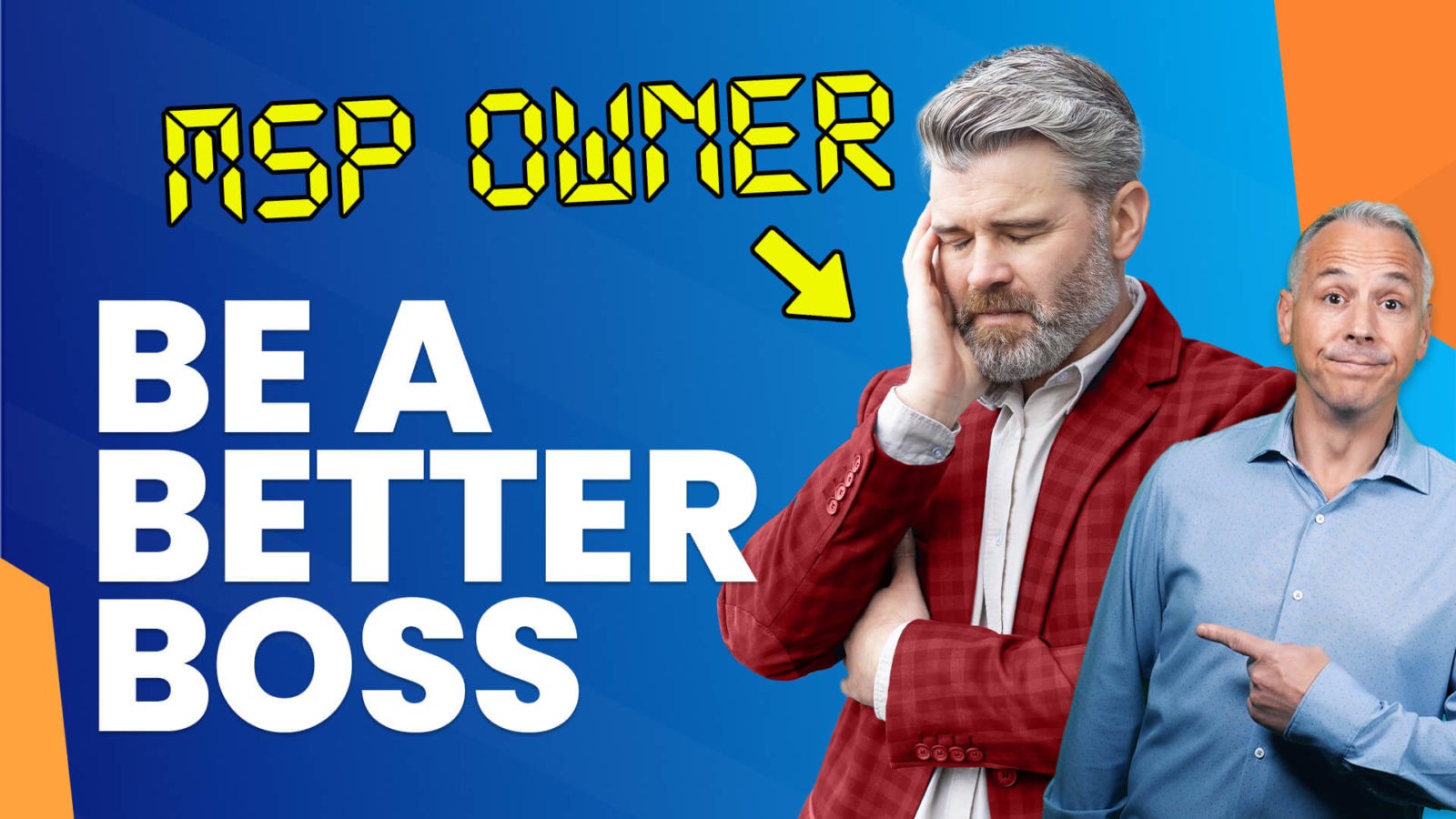
The podcast powered by the MSP Marketing Edge
Welcome to Episode 289 of the MSP Marketing Podcast with me, Paul Green. This week…
- Accountable to no-one: A blessing or curse?: There is a huge benefit of being accountable to someone, and being accountable to your team is a great way to make sure you get things done. It forces you to plan ahead, be more disciplined, and be a better team player.
- The free MSP marketing tactic that nearly got me arrested: This is a lesson in lateral thinking. You don’t need lots of money to market your MSP, you just need a desire to get new clients, some ideas, and a little time to implement.
- How this MSP built a GREAT marketing system: My guest shares the warts and all story of how she grew her MSP, and how it really took off when she put in place a proper marketing system.
- Paul’s Personal Peer Group: Should MSPs use WhatsApp for marketing? My answer to this question might surprise you.
Accountable to no-one: A blessing or curse?
The joys of being an MSP owner… complete control. Yeah you want to be always onboarding new clients and improving your tech stack and providing the best customer service. But if one week you don’t want to do those things, no one can stop you from not doing those things, because you’re the owner of the business. You’re the boss, right?
Well, if right now you’re not accountable to anyone, there is a huge benefit of being accountable to someone. But who is this person you should answer to? Stick around, you’re not going to believe who I’m going to suggest.
There are many reasons why someone starts their own business and I say that as someone who’s been in business for 20 years himself. People who don’t start their own business think that we do it so that we can earn more money and not have a boss. But I think those of us who’ve been doing it for more than a couple of years, which means we are going to keep doing it for a couple of decades, we know that we started our own business primarily to have control.
And by that I mean control over what work we do, who we do it for and how it’s done. Most of us, I believe, start our own business because we have a deep desire to do something amazing and we want to control freak it all along the way. Sometimes when we work for someone else, we’ve had bad bosses. I know that I have, I’m looking at you, Terry, but also we’ve had good bosses. I’ve had some of those as well, fact loads of those. But escaping the boss is not always the reason why we start our own business.
As I say, making more money and building an asset, something that you own, that’s the side benefit I believe of running your own business. I truly believe control is the primary driving factor for doing it and keep doing it. But nevermind all of these upsides of starting your own business and not having a boss, let’s look at the downsides as well. And I don’t really mean the fact that you for many years, worked longer hours than you ever have for probably a lower salary, that does eventually go, but it’s mostly a pain in the first few years, I don’t mean that stuff. I do mean the downsides of not having a boss. Because, and this might be hard to swallow, but there really are downsides to not having a boss.
The biggest downside to not having a boss is that you are accountable to no one.
Think back to when you last had a job. Someone, somewhere was in charge of you, right? You were accountable to someone in some way and forgetting all the negative impacts of that, there were positive impacts of that as well. And the primary positive impact was that if you didn’t do your work, someone would notice and there would be a problem. But as the business owner, this is not the case, right? Let’s take a marketing project that you’ve been promising yourself, you’re going to do for ages, but there’s no one chasing you to get it done. If you choose not to do that, or if you choose not to investigate that new PSA that you’ve been thinking of switching to, no one’s ever going to raise that in a meeting. Or if they do, you’re the boss, it doesn’t really matter that you haven’t done that. It’s your business, it’s your decisions, you have the control. And sure, I really do think that’s a great thing, but I do believe it’s a bad thing as well. It’s both of these things.
I’ve been getting more heavily involved over the last few months in the development projects that we have in our business. Because we have a development team who work on our portal and our product and our website and our marketing, and they do a fantastic job. But I wanted to insert myself kind of more closely into the process so I could guide it more, try to streamline it a bit, get things happening more quickly. And I realised that as part of that team, I needed to take on board some of the tasks that come out of any project. And as a result of that, because I’m a team player, I now have tasks that I must get completed to specific deadlines. And if I don’t, there are actually people that I have to answer to – my own team.

So you might think I’m crazy for doing this, but do you know what? It’s reawakened something within me that I’m really enjoying, and that’s a desire to do a great job for the person I’m accountable to. For years really, I’ve only been accountable to myself, kind of my clients, kind of my family, but now I’m accountable to my team as well. They’re people I have to face on Zoom calls every single day. And it has changed the way that I work. I’ve always been a very deadline driven person, but with the control of owning the business, I’ve been able to play loose with deadlines and just on a whim on a Friday afternoon, extend a deadline rather than put myself through the pain of doing the work. But now I can’t. And especially if the work I’m doing is a dependency for someone else, and by that I mean they can’t do their work until I’ve completed mine.
If someone is revising a page on our website and I’ve got to write that page first, you can see how if I don’t hit the deadline on that, neither can they. Can you see why being accountable to someone somewhere is a great way to make sure you get things done. It forces you to plan ahead, be more disciplined and be a better team player. And these are all great traits for the person who runs the business – YOU. It makes you a better business owner and definitely makes you a better boss.
So here’s a question for you. Within your MSP, who should you be accountable to? Do you have a service desk manager or operations manager that you can be accountable to? Perhaps you have a business partner and you can keep each other on the straight and narrow. What about your spouse, your other half? Could you be accountable to them for getting things done? Especially when the price of not getting those things done has an impact back on the family? I’d be really interested to know who you could be accountable to within your business.
Would you risk being arrested just to win new clients for your MSP? Sometimes when you have no money to market your business it can feel like you’re never going to achieve anything. I was in exactly this situation once and the craziest thing happened as a result of it. I did nearly get arrested. Let me tell you how.
This is a lesson in lateral thinking and how powerful it is to have zero marketing budget.
So jump in the DeLorean with me, it’s 2002 and I’m running a music radio station in the city of Peterborough here in the UK. And in the years before I joined the station had taken a real battering from its competitors. So my brief was to build up the audience again, and just to test me, the large media group that owned the station gave me this budget – ZERO DOLLARS. Now I can see that that was a blessing because it taught me the power of bootstrapping, where we had to do our marketing using only the existing resources we had in the station. And I learned so many valuable business lessons from that.
The way you market a radio station is different from the way you market an MSP. You need an easy direct marketing strategy such as my three step lead generation system – build audiences, grow relationships, and convert relationships – you can learn more about that @mspmarketingedge.com. But for radio marketing 20 plus years ago, it was all about just getting the name and the address out there. The name of the station, the type of the music it played, and the FM frequency. Yes, I’m that old, I worked on an FM radio station. In fact, I started my career on a medium wave on an AM radio station, please someone get me a walking stick.
Anyway, back in the day we did car stickers, we had a couple of promotional vehicles, but I couldn’t afford billboards or any kind of paid advertising, and yet I wanted to dominate the city. And then one day someone on my team came up with the most brilliant idea ever. We were discussing how dirty the pavements (AKA the sidewalks) were in our city and how they needed a good jet wash, like a pressure wash. And one of my colleagues joked, maybe we should clean them. And then another colleague said, what if we did clean them? But we used a template so it left behind our logo in the street.

That was such a good idea at the time, and today this actually has a name, it’s called Clean Advertising. It’s very clever, isn’t it? And the internet agrees it’s legal, at least here in the UK, because all you’re doing is cleaning the pavement, cleaning the sidewalk, you just happening to leave some of the dirt behind. But when we actually did this all over the city in 2002, the local council had a different idea. In fact, they went berserk. Perhaps it was because we’d shown everyone how dirty the streets were. I got a series of daily angry phone calls. In fact, one council officer even threatened to send the police to arrest me for vandalism, which is just hilarious. And I didn’t take those threats seriously.
Unlike the time the Diplomatic Protection police in London were actually going to arrest me because of a radio publicity stunt that we did at an embassy. But that’s a story of total stupidity best saved for another day. Anyway, to complete the story loop. Yes, the audience grew and actually that stunt kickstarted the best two years of my radio career, including winning a Sony award, which is like the UK radio equivalent of an Oscar.
So how can this story help your MSP? Well, as I said at the start, this is a lesson in lateral thinking and actually how powerful it is to have zero marketing budget. You don’t need money to market your MSP, you just need a desire to get new clients, some ideas, and a little time to implement.
How this MSP built a GREAT marketing system

Featured guest: Dawn Sizer is a CEO and technologist with security, training, and policy specialisations. She holds an MBA in IT, as well as standard certifications while still making technical information relatable for any audience. She sits on Partner Advisory Councils of the top Distributors, Security, and Cyber Insurance companies in the space, as well as The Channel Company for Xchange events.
Dawn has been married for 29 years to her husband and partner in everything. They have two young men, a fuzzy eared dog named Pilot, and a crazy pittie named Odin.
Nothing’s more inspirational than hearing how other MSPs have beaten the odds and turned their business into a success and I’ve got another great example for you right now. This MSP is sharing the warts and all story of how she grew her business, including how it really took off when she put in place a proper marketing system.
Hi, I’m Dawn Sizer, CEO of 3rd Element.
And thank you so much for joining me on this show, Dawn. You and I actually started a conversation like seven or eight months ago. We were both at ScaleCon ‘24 in Las Vegas and we were going up in Kevin Clunes sort of after conference party thing where there’s this big wheel that goes round like an observation wheel in Las Vegas. And we were having a really good conversation and then got split off into separate groups to go into separate pods. And it’s taken us seven months to jump back on and continue that conversation. I can’t even remember what we were talking about.
Yeah, it was all over the place. And I think what we probably should have realised at the time, they gave us these cool little coloured bracelets and we probably should have said, Hey, our bracelets are different colours, we should probably fix this.
And steal someone else’s bracelet. We know to do that, I know Kevin Clone listens to this podcast so Kevin, when you do your after conference stuff at ScaleCon ‘25, which I’m definitely going to when that’s announced anyway, then yeah we’ll have to do that this year.
So thank you for joining me on the podcast, Dawn. Tell us a little bit about you. We’re going to be talking about getting marketing done and how as an MSP, the hardest thing in the world sometimes is just getting started with your marketing, keeping that marketing going, and turning a series of difficult activities into a system so that you do it regularly. And I know that’s something that you’ve got pretty good at. So just tell us a little bit about you. What’s your MSP business owning story and sort of bring us from where you started up to where you are today.
So this is a 20 year tale, believe it or not, we started this business 20 years ago. I literally worked at another service provider previously to this, I was a service manager there and quit my job one day and started the company the next. So it was one of those things where I couldn’t take it anymore, was pretty sure that we can do it better, and here we are 20 years later. So that’s the history of it in a nutshell.
I love that. So 20 years ago, we’re talking 2005, I guess, did you start out doing break/fix or did you jump straight into the recurring revenue?
We jumped straight into the recurring revenue, which was not necessarily a thing at that time. More context around that, my husband and I both worked for the same service provider before that. We started this business together. So we literally had two household incomes at nothing for a year and a half. So we had no other choice then for this to work.
I mean you must’ve been one of the first MSPs I guess in terms of actually getting people onto recurring revenue contracts and taking that bigger view, which obviously everyone has today. That must’ve been so scary with both of you quitting your job. I quit my job probably about the same time actually, 2005 and started my first business and I earned very little for the first few months, but my wife at the time was still bringing in her income, so it wasn’t quite as scary for me. And we didn’t have kids or anything at that point. But yeah, for both of you, that must’ve been touch and go I guess at some points.
Yeah, I mean apparently we thought it would just be a fantastic idea to have a mortgage payment and kids and everything else. Who does that?
Yeah, exactly. So 20 years on, what kind of business do you have now? How many technicians do you have and whereabouts are you based by the way?
We’re in central Pennsylvania, right next to Amish country, the epitome of technology. But as far as we are, I believe 18 people, most of us are technical at this point. I think we only have three or four people that are not technical.
Okay. So the vast majority of the business is obviously there to deliver clients, but I know that you spend a great deal of your time bringing on board new clients or trying to find new business. So let’s talk about marketing. Now this is a recurring theme, this podcast has been going well over five years and a recurring theme is that MSPs find marketing hard. What was the point where you realised if you want to grow the business, you’ve got to get good at marketing?
Probably about three or four years ago. And it’s not like I didn’t know marketing was important before that. I think we have all lit money on fire on marketing over the last couple of years in some way, shape or form. You throw money at one thing and that doesn’t work and you throw money at another thing and that doesn’t work, and I think we’ve all had that scenario. Then I ended up talking with some folks that just do marketing for a living and really listening to what they were telling me.
It’s very difficult to take the language that we use every day and put it into a different lens for a client to understand it.
So we hired a group to do that for us. We had our messaging that was very clear, very concise, very effective. So I think that was step one, getting that message very clear and effective.
And what difference did you see from being able to communicate to the ordinary business owners and managers that you wanted to influence? What was the difference you saw from being able to say to them, this is what we do and this is what’s in it for you, these are the benefits?
Literally, that’s what it was. So you could take all the, I don’t want to say word vomit, that we throw at people of this is what we do. And then they were able to come back and say, oh, now I understand exactly what it is that you do, and I understand how it applies to me. So I think that was a huge leap forward.
And how did that make going on and then doing other marketing or actually sort of implementing marketing easier?
So the framework that we had gotten back gave us all of the language that we needed to use on repeat over and over and over again. So I was able to take that and incorporate the language into everything from landing pages to handouts that we’re giving folks, to web pages, to social media marketing, anything around language that you’re going to use. I was able to take it, copy it, adjust it, run it through Copilot, do whatever you need to do and have it be repeatable.
Got it. And at the risk of putting words in your mouth, and please do disagree with me if this is not the case, but was it a case that once you got that messaging really clear and you’d simplified it down and knew exactly what to say and how to say, you just then kept repeating that and tried not to deviate off that? Because I think the risk is sometimes that when you’ve got something like that, you’ve got a clear message, you run it out for six months and you almost get bored of it yourself, don’t you? Because you’ve seen it 1000, 2000, 3000 times, but you forget that the people you are reaching have seen it once, maybe twice
100%, you’ll get sick of it, there’s no doubt about it. What I have found, there are some products out there that you can actually input your brand voice into. So that messaging that you have very clear and what it looks like and the words that you’re using on repeat, you can enter that into their AI function and it will repeat some of that language for you as well. So you’re not stuck writing it on your own. So you’re going to get, okay, here’s my brand voice. I need you to create a thing that looks like this, but use my brand voice and it’ll just go back through it. And then all you have to do is humanise it after that.
Yeah. I love that. So let’s talk about other practical marketing. So you’ve now got a very clear message, you know what it is you want to communicate. What did you find were some of the most effective ways to reach decision makers and what were some of the least effective ways?
Spray and pray is the least effective. I think we’ve all done that. Pay per click is something that I haven’t had success with. Some of the marketing agencies that we’ve used that have been not MSP friendly have not been as on target as well. So sometimes I thought, well, maybe if we thought outside the box, that would work better and it didn’t. Sometimes it was like, okay, well let’s go back in the box and that necessarily didn’t work either. So there’s definitely a method to the madness, and I think we have finally found the method to the madness, and it is repeatable process, not who you use, not what you use. But it’s repeatable process over and over again. You have to touch people so many different times in order for it to be effective.
Yeah, this is just music to my ears because you are absolutely right, and I’ve been preaching for years, set up a marketing system, set up small marketing actions or tasks, ideally things you can get other people to do for you. And then just make sure those things happen every day or every week or every month, however often they get repeated. And then just do that for 10 years. And you’re absolutely right, you can Google this, how many touch points does it take to turn someone from a prospect to a client. And you’ll see answers from seven up to 50, and I think the answer is like 500. It’s because actually the way that people buy these days, and especially how they buy managed services, something ordinary business owners don’t understand is it will take a number of emails that they read of yours, maybe a number of podcast episodes if you put those out, a number of videos that you watch, a number of phone calls, a number of messages on LinkedIn or emails or a number of, I mean, there’s so many other ways of touch pointing someone. What are some of the things that you are using now? So if we jump back to today and you were to pick out the top three tactics that work best for you as part of your system. Let me change that question. What are the three that you would not want me to take away from you? That’s probably the right question to ask.
Email sequencing is a big one. I do like that. I do like to be able to track and see who’s clicking on what and what that looks like. So I am still a numbers person at the end of the day, and I don’t know if that’s good or not good. I don’t know that there’s a real method to that madness, if you will. But the KPI piece to it, I want to be able to see of the, in this case, it was 2,600 emails that I sent out, how many people clicked on them, how many people opened them? What does that look like? And then when they did a thing, when I’ve sent them another email based on off of an action that they did, what was my open rate? Well, it turned out my open rate was like 98.7% or something crazy. So it was really good. So I’m getting really good traction in places, so taking away my KPIs would make me cry.
So email sequencing one, what else could I take away and make you cry?
Landing pages are another one. I think it’s really good if you have an asset, a giveaway or something along those lines to set up a landing page for somebody to go get that particular piece of content, whether, again, whether it’s an ebook or a white paper, whatever it is. But not only are you grabbing their information on that, and even if it’s just their first name and an email address so that you can send them something later, but it’s a touch point. That particular person has gone to that page, you know they’ve interacted with it, they thought it was important enough to go get it. So you know that you have somebody that’s interested at that point and you can nurture them along for a little while. So that would be another one. And then the last one I think is any type of CRM. If you don’t have a CRM to be able to do any of these things, and whether it’s put email out, do social media, get any type of reporting, you’re doing yourself a disservice.
And I’m going to have to ask you which CRM you use. I don’t particularly, I was going to say don’t care, of course I care about your answer, but I’m not that interested in the answer. But I know that every MSP listening to this would want me to ask that question. So you obviously have a successful marketing machine you’ve set up, which CRM are you using?
So we were using HubSpot for a while, and I think that works really, really well. We needed some additional capability and we switched over to Insightly at the beginning of the year. So I don’t know that there’s a good answer, right? I think everybody does things a little bit differently and there may be pieces or parts to certain CRMs that make more sense to one MSP over another.
Yeah. I always say to MSPs, pick a CRM something you like, stick with that. And then maybe a few years down the line, review it and check it. We were with Keap pretty much since I started the business in 2016. And we are currently migrating to HubSpot. And HubSpot’s like a thousand times better than Keap. But there are still some things I miss from Keap. I miss their ways of working, the way they structure data. HubSpot is obviously a whole different beast. I do miss the bill. The Keap Bill is perhaps a fifth of what the HubSpot bill is, but I can do a lot more with it. So there we go. But anyway, you’re absolutely right, whichever CRM you choose, just pick one, stick with it, review it a few years down the line, almost like treat your marketing stack like your tech stack. Don’t be constantly fiddling with it, but just pick something and stick with it.

Okay, Dawn, final question for you. You have built up a true marketing machine. I know it’s working wonders for your business. You’re bringing in new clients, you’re nurturing prospects all the time. And I know that you’ve obviously done that the hard way over a number of years, you got very clear on your brand voice, you got very clear on the messaging, but you’ve then done the hard work and you’ve put in place all of these things like the ones you were just talking about. What would you say to an MSP who’s listening to this, who desires great marketing but hasn’t really got started with it yet? What’s the motivation that they need just to get started?
There is no motivation to get started, you just have to do it. I think to be fair, as a business owner I think all of us are eat the frog people, right? There’s always a task that nobody ever wants to do, and you just have to force yourself to go do it. Marketing was one of those things for me. If anybody’s ever seen me speak, especially if they’re watching me speak about automation, I actually talk about how marketing is one of the pieces that I’ve automated in some respects because I dislike it so much. And it’s not because I truly dislike it, it’s that I find it fiddly. I find all of the nuances to it difficult because I’m a technical person. So I think it’s just more a matter of just get started, do one thing at a time, and then add something else to it and something else and something else. And eventually you create a little machine out of it. Automate as much as you can, and when in doubt, outsource what you can.
Thank you, Dawn, for your time today. And I know you have a community which is for MSPs, which helps them with their business. Do you want to tell us just a little bit about that community and how we can either join it or get in touch with you?
Absolutely. So for those of you that aren’t aware of the Tech Degenerates, by all means go take a look. We’re on the web, you’ll find us on LinkedIn, as well as Facebook and all the other normal social media things. You may have seen us at IT Nation over in the UK or in the United States, but either way, it’s a great community of other MSP owners, and we’d love to see you there. And that website to visit is thetechdegenerates.com
Paul’s Personal Peer Group
Luke in Connecticut where his MSP is based, has this question: Should I use WhatsApp in my marketing?
There are only a few MSPs doing this at the moment, that I’m aware of anyway, and if you’re using it please let me know. But I think using WhatsApp as a marketing channel has huge potential in the near future. And why, well, I don’t know about you, but about 80 to 90% of my own personal messaging is now done through WhatsApp. Here in the UK it’s very, very big. Although I do appreciate that’s not the case everywhere.
Here’s the thing though, it’s always sensible to try to reach people on the platforms they’re already using and very little commercial B2B messaging is currently done through WhatsApp. I know that is starting to change, and especially since a few years ago, Facebook rewrote all of the base code of all of its apps – Facebook, Instagram, Messenger, Threads, WhatsApp – and that was so they could more easily pass information around all of the different platforms. And there is of course a WhatsApp business app, which has an API. So the tools are there to use. It’s just a case then of how are you going to use them. Let me give you three ideas of how you could use WhatsApp within your MSP.
So number one, you could use it as a call to action on your website, literally, “WhatsApp us”. And there are apps that allow easy messaging via multiple platforms. Maybe WhatsApp is a bit of a consumer call to action, but you know what, if you’re in a country like the UK where people just use WhatsApp, then for them pressing a button or picking up their phone and WhatsApping a number is an easy thing for them to do. And if it’s easy, it removes friction and more people will talk to you.
Number two, you can share content with people. And of course you’d need their mobile number and they might be a bit resistant to giving that to you. So you can of course, spam them via their favourite and currently spam free messaging platform. And I do mean sending them messages on WhatsApp. I’m starting to get a little bit of spam now, maybe you are as well, but actually if you send high value content that’s relevant to people, that’s not as spammy.
And then number three for ticket updates to end users, people you are helping right now. And I know you’d probably rather just stick to email updates or ticket updates on your PSA platform or something they’ve logged into or whatever. But remember something I said earlier, it’s always sensible to try to reach people on the platforms they’re already using. So if WhatsApp is a big part of their life and you send them updates on your ticket via WhatsApp, that actually provides a better level of customer service, there’s so much less friction in that.
Now I’m going to be keeping a close eye on the B2B applications of this, and I will update you as more and more MSPs generate more use cases.
Mentioned links
- This podcast is in conjunction with the MSP Marketing Edge, the world’s leading white label content marketing and growth training subscription.
- Join me in MSP Marketing Facebook group.
- Connect with me on LinkedIn.
- Connect with my guest, Dawn Sizer on LinkedIn, and visit the 3rd Element Consulting website.
- Got a question about your MSP’s marketing? Submit one here for Paul’s Personal Peer Group.
